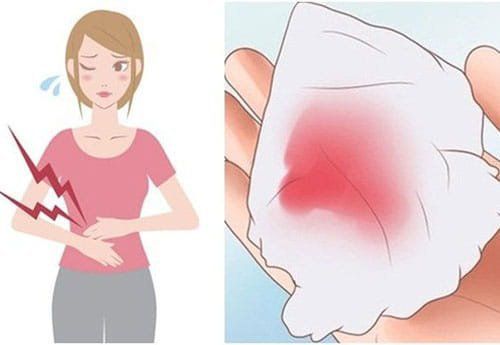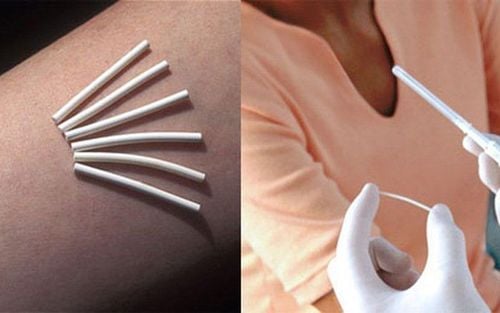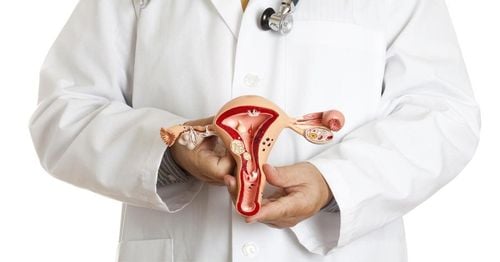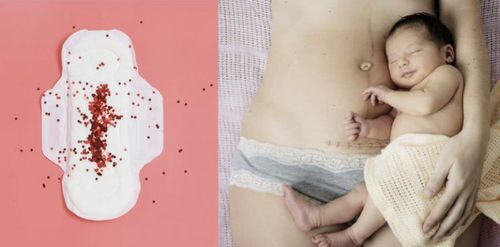This is an automatically translated article.
After giving birth, the mother's hormones change, the hormone prolactin increases to stimulate breast milk secretion, affecting the function of the ovaries, inhibiting the production of estrogen. Since then, it affects the menstrual cycle of women. In addition, psychological stress, postpartum fatigue, not eating enough, staying up late... also affect the menstrual cycle, leading to some menstrual irregularity or less, coming early next month. , next month late...1. When do you get your period after giving birth?
After giving birth, the condition of having less, more or normal periods depends a lot on whether the mother is breastfeeding or not. In women who are not breastfeeding, about 40% of women have their first period 6 weeks after giving birth, and about 90% of women get their period again 24 weeks after giving birth.
As for breastfeeding women, only 15% of women get their period again after 6 weeks. However, they are all capable of becoming pregnant. The likelihood of ovulation before first menstruation in lactating women increases from 33-45% in the first trimester to 64-71% in April-December and 87% after. December.
In the first 6 months after giving birth, if a woman exclusively breastfeeds (90% of her baby's nutrition comes from breast milk) and does not have a period, the woman has very little risk of becoming pregnant, and there is no need to apply pressure. Use another method of birth control.
That's because when breastfeeding, increased prolactin inhibits ovulation. After 6 months, the effectiveness decreases, it is necessary to apply another method of contraception. Or if your period returns during this time, you need to apply another method.
Trắc nghiệm: Sự hiểu biết của bạn về kinh nguyệt
Kinh nguyệt có vai trò quan trọng đối với sức khỏe sinh sản, do đó nữ giới cần chủ động trang bị kiến thức để theo dõi và kiểm soát tình trạng sức khỏe. Bài trắc nghiệm sau đây sẽ giúp bạn hiểu hơn về chu kỳ kinh nguyệt của bản thân.2. Menstruation is less after giving birth
The amount of menstrual blood is often related to the thin thickness of the uterine wall in the mother's body, if the uterine wall is thin, the menstrual blood is less, and if it is thick, it is more. If the postpartum period has a relatively small amount of menstrual blood, it is still normal. Because the cause of the postpartum period is less due to:Breastfeeding: After giving birth, when breastfeeding, the mother's body will have a number of hormonal changes that make the menstrual cycle irregular and even no period. These hormonal changes include prolactin secretion during lactation which alters the functioning of the hypothalamic, pituitary and ovarian systems. So even after your period has appeared for the first few periods, it may still be light or irregular. These cycles may even be different from the cycles before you had children. These changes can continue to change indefinitely or even change permanently.

Khi cho con bú, cơ thể người mẹ sẽ có một số những thay đổi nội tiết làm cho chu kỳ kinh nguyệt trở nên không đều
Changes in hormone levels: During pregnancy and childbirth, the estrogen hormone in a woman's body will have certain changes. This makes the menstrual cycle of women after giving birth often disturbed, even missing a period for a long time. Due to stress and fatigue: Pregnancy makes women always feel stressed and tired. This long-term condition causes the organs in the reproductive system to stop and causes menstrual disorders in women after giving birth. Besides, taking care of the baby makes the mother's body not completely rest, which is also the reason for having less menstrual periods than usual after giving birth. Gynecological diseases: After giving birth, many women suffer from diseases such as polycystic ovary syndrome, ovarian failure,... This is one of the main causes of menstrual disorders after childbirth in general in women. female. In case of postpartum period less than usual, along with the following abnormal symptoms, you should go to the hospital for an early examination:
The blood is bright red and lasts for more than a week. Sometimes you see blood clots after giving birth. This is completely normal. However, if the clot is too large or lasts too long, see your doctor. If the blood changes from bright red to another color but suddenly turns bright red again. Normally, menstrual blood will have a bad smell, but if the smell is too strong, you should consult your doctor immediately. When you feel pain in the uterus or surrounding areas, go to the doctor early to detect the cause and handle it promptly, avoiding unwanted complications. If mothers do not experience the above signs, it is completely normal to have a light period, can rest assured and do not need to be too worried. Because it's just the hormonal changes in the body of mothers after giving birth and breastfeeding.
3. Postpartum care for a regular menstrual cycle
Clean the intimate area, especially in the days leading up to the menstrual cycle. During these days, you should pay attention to change the tampon every 4 hours. Always keep the intimate area dry and use quality tampons, soft, thin, dry and comfortable. Don't want to lose weight suddenly because of low self-esteem. The change in weight of women after giving birth is also the cause of changes in hormone levels leading to menstrual disorders. Add to your menu foods rich in zinc, omega 3, vitamins C, E... and green vegetables rich in fiber and minerals. Actively move your body with moderate exercise to protect your health and help your menstrual cycle be more regular. Keeping yourself in a comfortable and happy mood, talking to your children and family members more and limiting stress and fatigue for a long time will help improve this situation after giving birth.

Giữ cho mình tâm trạng thoải mái vui vẻ, trò chuyện với con, hạn chế mệt mỏi
Sleeping 8 hours/day, getting enough sleep is very good for human health, especially for postpartum women to regulate the menstrual cycle. Supplementing with estrogen directly will help improve irregular and erratic menstrual periods after giving birth faster. The hormone supplementation for the body must be in the right way, in the right dose. Therefore, you should consult a specialist. Currently, Vinmec International General Hospital has a basic gynecological examination and screening package, which helps customers detect early infectious diseases for easy and inexpensive treatment. Screening for early detection of gynecological cancer (cervical cancer).
When registering for the Basic Gynecological Examination and Screening Package, customers will receive:
Specialized gynecological examination Transvaginal Uterine Ovarian Ultrasound Transvaginal Breast Ultrasound Tests such as: Treponema pallidum rapid test, Chlamydia rapid test, taking samples for cervical-vaginal cytology, endoscopically stained bacteria (female vaginal fluid), HPV genotype PCR automated system. Total urinalysis by automatic machine. Vinmec's medical team are leading experts, highly qualified, dedicated and devoted to the benefit of patients. Comprehensive and professional medical examination, consultation and treatment services.
Please dial HOTLINE for more information or register for an appointment HERE. Download MyVinmec app to make appointments faster and to manage your bookings easily.













